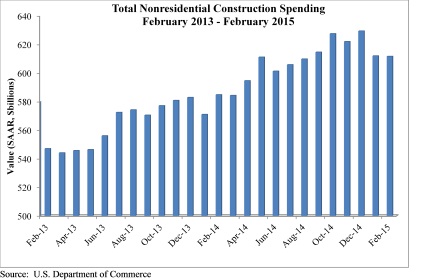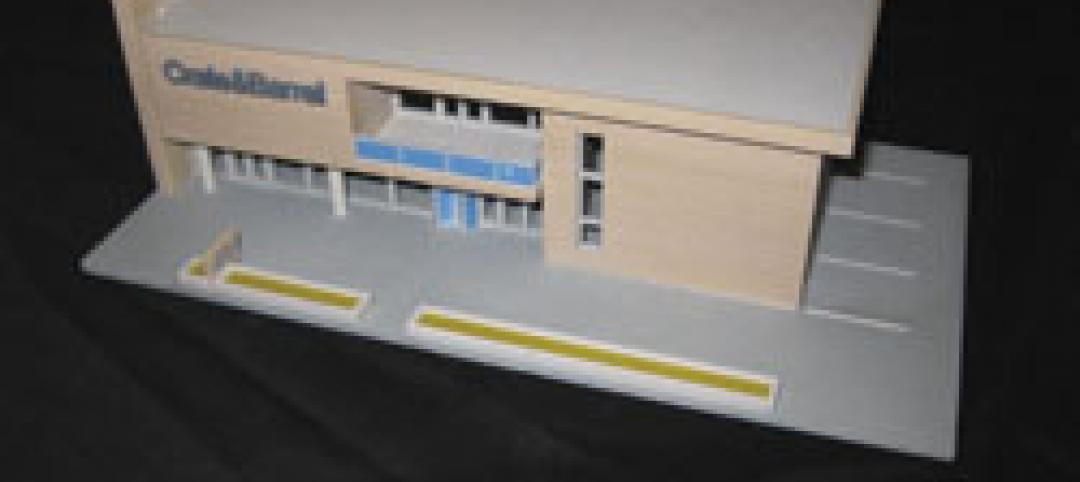Blame it on the weather. That's what many economists have been doing over the past two months as economic data continue to disappoint. Retail sales, durable goods orders, and other categories have not been as strong as anticipated.
Nonresidential construction has often proved an exception, with the industry's momentum gaining steam recently. However, in February, nonresidential construction spending remained virtually unchanged, inching down 0.1% on a monthly basis, according to the April 1 release from the U.S. Census Bureau.
The February 2015 spending figure is 4.6% higher than February 2014, as spending for the month totaled $611.5 billion on a seasonally adjusted annualized basis. The estimate for January spending was revised downward, from $614.1 billion to $611.9 billion, while the government revised December's spending estimate upward from $627 billion to $629.3 billion.

"Construction is impacted more by weather than just about any economic segment, and the impact of February's brutal weather is evident in the government's spending figure," said Associated Builders and Contractors Chief Economist Anirban Basu. "ABC continues to forecast a robust nonresidential construction spending recovery in 2015, despite the most recent monthly data, with the obvious exceptions of industry segments most directly and negatively impacted by declines in energy prices.
"The broader U.S. economy has not gotten off to as good a start in 2015 as many had expected with consumer spending growth frustrated by thriftier than anticipated shoppers," said Basu. "With winter behind us and temperatures warming, the expectation is that economic growth will roar back during the second quarter, which is precisely what happened last year. To the extent that this proves to be true, nonresidential construction's recovery can be expected to persist."
Seven of 16 nonresidential construction subsectors posted increases in spending in February on a monthly basis.
- Manufacturing-related spending expanded 6.8 percent in February and is up 37.9% on a year-over-year basis.
- Conservation and development-related construction spending expanded 11% for the month and is up 19.8% on a yearly basis.
- Office-related construction spending expanded 2.4% in February and is up 19% from the same time one year ago.
- Amusement and recreation-related construction spending gained 2% on a monthly basis and is up 22.5% from the same time last year.
- Education-related construction spending grew 0.3% for the month, but is down 0.6% on a year-over-year basis.
- Construction spending in the transportation category grew 0.6% on a monthly basis and has expanded 9.3% on an annual basis.
- Lodging-related construction spending was up 5% on a monthly basis and 10.4% on a year-over-year basis.
Spending in nine nonresidential construction subsectors failed to rise in February.
- Healthcare-related construction spending fell 0.9% for the month and is down 4.5% for the year.
- Spending in the water supply category dropped 7.8% from January, but is still 7.4% higher than at the same time last year.
- Public safety-related construction spending lost 2.2% on a monthly basis and is down 9.6% on a year-over-year basis.
- Commercial construction spending lost 1.9% in February, but is up 13.5% on a year-over-year basis.
- Religious spending fell 4.8% for the month and is down 10.3% from the same time last year.
- Sewage and waste disposal-related construction spending shed 1.4% for the month, but has grown 19.9% on a 12-month basis.
- Power-related construction spending fell 4.5% for the month and is 17.2% lower than at the same time one year ago.
- Lodging construction spending is down 4.4% on a monthly basis, but is up 18.2% on a year-over-year basis.
- Sewage and waste disposal-related construction spending shed 7.5% for the month, but has grown 16% on a 12-month basis.
- Power-related construction spending fell 1.1% for the month and is 13.2% lower than at the same time one year ago.
- Communication-related construction spending fell 6.1% for the month and is down 15.5% for the year.
- Highway and street-related construction spending was unchanged in February and is up 3.3% compared to the same time last year.
To view the previous spending report, click here.
Related Stories
| Sep 13, 2010
3D Prototyping Goes Low-cost
Today’s less costly 3D color printers are attracting the attention of AEC firms looking to rapidly prototype designs and communicate design intent to clients.
| Aug 11, 2010
Minneapolis Public Housing authority, Honeywell launch energy retrofit program
Minneapolis Public Housing Authority and Honeywell today announced a $33.6-million energy efficiency and facility renewal program that will help the housing authority improve its infrastructure, reduce its impact on the environment, and save more than $3.7 million in utility costs per year. Local contractors will also complete a majority of the work for the program, one of the largest of its kind for a public housing authority, helping boost the Twin Cities job market.
| Aug 11, 2010
Skanska Promotes Richard Kennedy to COO for NY/NJ Metro Area
Skanska USA Building Inc., headquartered in Parsippany, N.J., has announced that Richard Kennedy was promoted to Chief Operating Officer from his previous role as Senior Vice President – General Counsel. Kennedy’s promotion marks the latest addition to Skanska’s national leadership team.
| Aug 11, 2010
The New Yorker's David Owen: Why Manhattan is America's greenest community
David Owen is a staff writer at The New Yorker and the author of 14 books, most recently Green Metropolis: Why Living Smaller, Living Closer, and Driving Less Are the Keys to Sustainability, in which he argues that Manhattan is the greenest community in America. He graduated from Harvard and lives in Washington, Conn., where he chairs the town planning commission.
| Aug 11, 2010
Sustainable Buildings as Teaching Tools: 4 Strategies for Integrating Buildings into Experiential Learning
4 Strategies for Integrating Buildings into Experiential Learning
| Aug 11, 2010
Morphosis builds 'floating' house for Brad Pitt's Make It Right New Orleans foundation
Morphosis Architects, under the direction of renowned architect and UCLA professor Thom Mayne, has completed the first floating house permitted in the U.S. for Brad Pitt’s Make It Right Foundation in New Orleans.The FLOAT House is a new model for flood-safe, affordable, and sustainable housing that is designed to float securely with rising water levels.
| Aug 11, 2010
McHugh completes ultra-lux Capella Telluride hotel in Colorado
James McHugh Construction Co. has completed the new Capella Telluride hotel and condominium resort in Telluride, Colo., the first U.S. property for the new ultra-luxury Capella Hotels brand. Positioned to compete with the elite levels of luxury brands, the Capella Telluride features complex stone, stucco and wood exterior, heavy timber construction, and an abundance of high-level finishes and amenities.
| Aug 11, 2010
Bovis Lend Lease, Webcor among nation's largest multifamily contractors, according to BD+C's Giants 300 report
A ranking of the Top 50 Multifamily Contractors based on Building Design+Construction's 2009 Giants 300 survey. For more Giants 300 rankings, visit http://www.BDCnetwork.com/Giants








